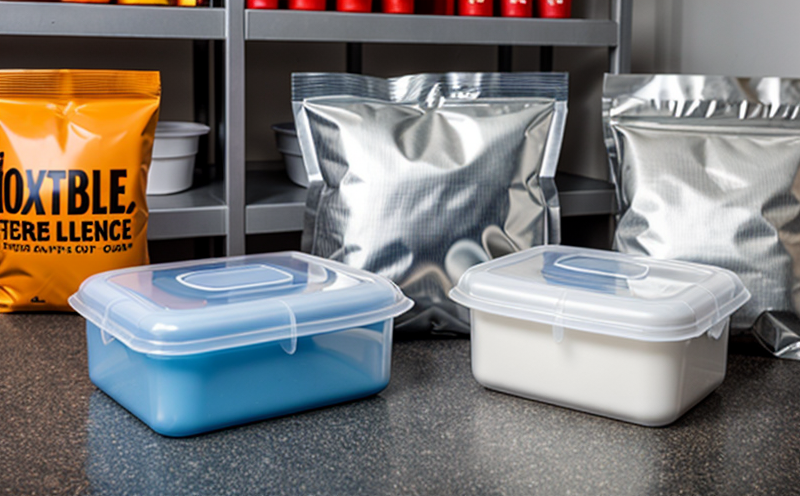ASTM D2579 Heat Seal Strength of Flexible Packaging
The ASTM D2579 standard is a widely recognized method used to evaluate the heat seal strength of flexible packaging materials. This test is crucial in ensuring that seals are strong enough to withstand the rigors of transportation, storage, and handling without compromising product integrity or safety.
The ASTM D2579 test measures the force required to separate two layers joined by a heat-seal process. The parameters tested include both peel strength (the force applied along the seal line) and shear strength (the force applied perpendicular to the seal line). These tests are essential for quality control, ensuring that packaging seals are robust enough to maintain product freshness and safety.
The test is typically performed using a tensile tester equipped with appropriate fixtures. Specimens are cut from the packaging material according to ASTM D2579 specifications. The testing setup ensures that the seal line is aligned correctly to simulate real-world conditions as closely as possible. Once prepared, the samples undergo a peel test or shear test depending on the specific ASTM D2579 variant being used.
The results of the ASTM D2579 test are critical for compliance with international standards and regulations. For instance, many industries rely on packaging that meets these specifications to ensure product safety and regulatory compliance. This includes food manufacturers who must maintain seal integrity during shipping and storage to prevent contamination or spoilage.
Quality managers and compliance officers can use the results of ASTM D2579 testing as a key metric for assessing the quality of their flexible packaging materials. R&D engineers benefit from this data in optimizing the design and production process, ensuring that new formulations meet both performance expectations and regulatory requirements.
The peel strength test measures how much force is needed to separate two layers along the seal line. The shear strength test evaluates the strength of the seal when a perpendicular force is applied. Both tests provide valuable insights into the durability and reliability of packaging seals, which are critical factors in product safety and quality assurance.
Compliance with ASTM D2579 ensures that flexible packaging meets industry standards for heat-seal integrity. This is especially important for industries such as food and pharmaceuticals where seal strength directly impacts product quality and consumer safety.
Industry Applications
- Food Packaging: Ensures that seals are strong enough to protect perishable goods during transportation and storage.
- Pharmaceuticals: Guarantees that packaging maintains the integrity of prescription drugs, ensuring they remain effective and safe for use.
- Chemicals: Prevents leaks of hazardous materials by confirming that seals are robust enough to withstand environmental stresses.
- Beverages: Ensures that containers maintain their integrity during distribution, thus protecting the quality of the product.
The ASTM D2579 test is not only essential for ensuring compliance with industry standards but also plays a crucial role in enhancing consumer confidence by guaranteeing the safety and quality of packaged goods. This testing process helps manufacturers align their products with global regulatory requirements, thereby facilitating international trade and commerce.
Eurolab Advantages
Eurolab offers unparalleled expertise in conducting ASTM D2579 heat seal strength tests for flexible packaging materials. Our state-of-the-art facilities are equipped with the latest testing equipment, ensuring accurate and reliable results every time.
- Accurate Results: Leveraging our advanced technology, we provide precise measurements that align perfectly with ASTM D2579 standards.
- Comprehensive Reporting: Our detailed reports not only present the test outcomes but also offer valuable insights and recommendations for improving packaging performance.
- Expert Staff: Our team of experienced professionals is dedicated to providing expert guidance throughout your testing process, from specimen preparation to final analysis.
- Compliance Assurance: Eurolab ensures that all tests meet the highest industry standards, helping you stay compliant with international regulations and guidelines.
We understand the importance of accurate and reliable data in ensuring product quality and safety. That's why we invest heavily in maintaining our facilities and continuously updating our methodologies to align with the latest ASTM D2579 specifications.
Competitive Advantage and Market Impact
- Enhanced Product Quality: By ensuring that all flexible packaging meets strict heat-seal strength standards, you can improve product quality and safety.
- Increased Consumer Trust: Consumers are more likely to trust products packaged in materials that have passed rigorous testing protocols like ASTM D2579.
- Regulatory Compliance: Meeting these standards helps manufacturers avoid costly legal issues and potential recalls due to non-compliance.
- Market Differentiation: Offering packaging that exceeds industry standards can set your products apart from competitors, enhancing brand reputation and market position.
The results of ASTM D2579 testing are a valuable asset for quality assurance departments. They provide critical data that informs decision-making processes regarding material selection, process optimization, and product development. By leveraging these insights, companies can enhance their operations and improve overall performance in the competitive market.





